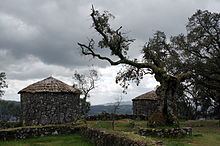Portugal
Map of Portugal (including mainland Portugal and the islands)
Portugal lost much of its wealth and status with the destruction of Lisbon in a 1755 earthquake, occupation during the Napoleonic Wars, and the independence of Brazil, its wealthiest colony, in 1822.[12] After the 1910 revolution deposed the monarchy, the democratic but unstable Portuguese First Republic was established, later being superseded by the "Estado Novo" right-wing authoritarian regime. Democracy was restored after the Portuguese Colonial War and the Carnation Revolution in 1974. Shortly after, independence was granted to all its colonies, with the exception of Macau, which was handed over to China in 1999.[13] This marked the end of the longest-lived European colonial empire, leaving a profound cultural and architectural influence across the globe and a legacy of over 250 million Portuguese speakers today.
Portugal maintains a unitary semi-presidential republican form of government[14][15][16][17] and is a developed country with an advanced economy, and very high living standards,[18][19][20] having the 18th highest Social Progress in the world, putting it ahead of other western European countries like France, Spain and Italy.[21] It is a member of numerous international organizations, including the United Nations, the European Union, the Eurozone, OECD, NATO and the Community of Portuguese Language Countries. Portugal is also known for having fully decriminalized the usage of all drugs in 2001, the first country in the world to do so.
History
Main article: History of Portugal
Early history: Iberians and Celts
Main articles: Lusitania and Kingdom of the Suebi
Citânia de Briteiros, in the Minho Province, is the best preserved Iron Age and Castro culture site in Portugal.
The region of present-day Portugal was inhabited by Neanderthals and then by Homo sapiens, who roamed the border-less region of the northern Iberian peninsula.[24] These were subsistence societies that, although they did not establish prosperous settlements, did establish organized societies. Neolithic Portugal experimented with domestication of herding animals, the raising of some cereal crops and fluvial or marine fishing.[24]
It is believed by some scholars that early in the first millennium BC, several waves of Celts invaded Portugal from Central Europe and inter-married with the local populations, forming different ethnic groups, with many tribes.
Chief among these tribes were the Calaicians or Gallaeci of Northern Portugal, the Lusitanians of central Portugal, the Celtici of Alentejo, and the Cynetes or Conii of the Algarve. Among the lesser tribes or sub-divisions were the Bracari, Coelerni, Equaesi, Grovii, Interamici, Leuni, Luanqui, Limici, Narbasi, Nemetati, Paesuri, Quaquerni, Seurbi, Tamagani, Tapoli, Turduli, Turduli Veteres, Turdulorum Oppida, Turodi, and Zoelae.
There were in the southern part of the country some small, semi-permanent commercial coastal settlements founded by Phoenicians-Carthaginians (such as Tavira, in the Algarve).
Roman Lusitania and Gallaecia
Romans first invaded the Iberian Peninsula in 219 BC. During the last days of Julius Caesar, almost the entire peninsula had been annexed to the Roman Republic. The Carthaginians, Rome's adversary in the Punic Wars, were expelled from their coastal colonies.The Roman conquest of what is now part of modern-day Portugal took almost two hundred years and took many lives of young soldiers and the lives of those who were sentenced to a certain death in the slavery mines when not sold as slaves to other parts of the empire. It suffered a severe setback in 150 BC, when a rebellion began in the north. The Lusitanians and other native tribes, under the leadership of Viriathus, wrested control of all of western Iberia.
Rome sent numerous legions and its best generals to Lusitania to quell the rebellion, but to no avail—the Lusitanians kept conquering territory. The Roman leaders decided to change their strategy. They bribed Viriathus's allies to kill him. In 139 BC, Viriathus was assassinated, and Tautalus became leader.
In 27 BC, Lusitania gained the status of Roman province. Later, a northern province of Lusitania was formed, known as Gallaecia, with capital in Bracara Augusta, today's Braga. There are still many ruins of castros (hill forts) all over modern Portugal and remains of Castro culture. Numerous Roman sites are scattered around present-day Portugal, some urban remains are quite large, like Conímbriga and Mirobriga. The former, beyond being one of the largest Roman settlements in Portugal, is also classified as a National Monument. Conímbriga lies 16 km from Coimbra which by its turn was the ancient Aeminium). The site also has a museum that displays objects found by archaeologists during their excavations.
Several works of engineering, such as baths, temples, bridges, roads, circus, theatres and layman's homes are preserved throughout the country. Coins, some of which coined in Lusitanian land, as well as numerous pieces of ceramics were also found. Contemporary historians include Paulus Orosius (c. 375–418)[25] and Hydatius (c. 400–469), bishop of Aquae Flaviae, who reported on the final years of the Roman rule and arrival of the Germanic tribes.
Germanic invasions
The Suebi Kingdom in Green and the Visigothic one in Orange
Visigothic Hispania and its regional divisions in 700, prior to the Muslim conquest.
About 410 and during the 6th century it became a formally declared kingdom, where king Hermeric made a peace treaty with the Gallaecians before passing his domains to Rechila, his son. In 448 Réchila died, leaving the state in expansion to Rechiar.
In the year 500, the Visigothic Kingdom was installed in Iberia, centred on Toledo. The Visigoths eventually conquered the Suebi and its capital city Bracara (modern day Portugal's Braga) in 584–585. It maintained its independence until 585, when it was annexed by the Visigoths, and turned into the sixth province of the Visigothic Kingdom of Hispania.
For the next 300 years and by the year 700, the entire Iberian Peninsula was ruled by Visigoths, having survived until 711, when King Roderic (Rodrigo) was killed while opposing an invasion from the south by the Umayyad Muslims.







No comments:
Post a Comment